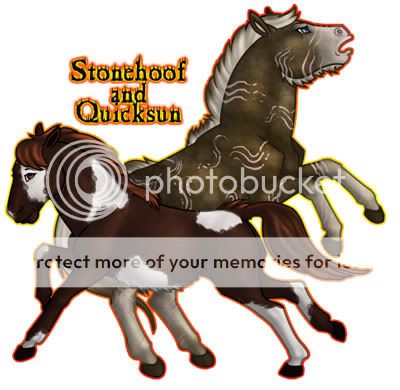about the herd
This is a place where fighting between species is not tolerated at all. It is a peaceful herd full of peaceful horses, and all who visit are expected to respect this.
There is a great fire that burns, carefully tended by a herd of horses that were responsible for stealing fire from man many, many years ago. This fire is sacred to all who live on the continent -- for some, it is warmth; for others, it is a sign of strength. More particularly, the strength to overcome the presence of man. The fire is a very sacred thing to most of the inhabitants.
The fire-keepers are in charge of protecting this fire, making sure that it never goes out, that it is always burning pure and hot. Those that visit the fire for the first time might be shocked at the size of the flame itself -- while not small, it is certainly not as huge and majestic as some might think. The fire is about the size of a small bonfire or campfire, kept above ground on a platform of stone that the first fire-keepers commissioned a small herd of mammoth to complete.
The current patron of the herd is the stallion shown above, Stonehoof. He does have a mate -- but she's not done yet, of course. They've also got grown children (which will probably be given away/contested off at some point in the future after the shop officially opens). Stonehoof's great, great grandfather was the first fire-keeper, having been the first (and so far only) horse to risk his life to steal the fire from man. The fire has not gone out after all these many years, and hopefully it will not go out for many years to come.
fire-keeper beliefs
...on life-matingLife-mating is a very serious and very celebrated occasion. Partnering is expected to occur during adolescence -- if no mate is found for a son or daughter, the parents will arrange a pairing. However, while it is expected for adolescents to find a mate, they will not be bound until they are adults. Marriages between a male and a female only occur once a year, during the binding.
...on binding'Weddings' -- or binding, as it is called in the herd -- is only held during the festival in spring of the same name. All pairs are presented by their parents to the Patron and the Matron, and they are blessed by the entire herd. Binding is very, very important to the entire herd, and these bonds can never be dissolved. Even if the binding is loveless, it matters not. Each horse in the herd is raised to honor these beliefs -- those that balk are exiled.
...on rogue-breedingAbsolutely not allowed unless there is no suitable male/female in the herd. To do so without permission runs the risk of exile.
...on adolescent breedingAbsolutely not allowed. To do so would bring great shame to the offender's family and the risk of exile is high.
...on familyFamily bonds are strong. This is encouraged -- while new life-mates are allowed to find their own footing in the herd, they will always have their families to fall back on. Foals are raised by the herd in general, and are constantly under guard. The young are cherished in this herd, and to lose one would bring great grief and sadness to the herd.
...on same-sex relationshipsAbsolutely not allowed, at least publicly. To be discovered means exile, and this would shame the family -- not because it's 'abnormal' but because the fire-keepers believe in male/female relationships, and all foals are raised to believe this as well.
...on responsibilities within the herdShunning responsibilities within the herd will not be taken lightly. Each horse has a duty within the herd and each duty is important. Duties are assigned four times a year during the festivals during foal-recognition. Horses do not choose what they would like to do -- they are assigned duties depending on what the herd needs at any given time. The Matron of the herd is responsible for assigning duties to the foals, and it is the parent's responsibility to train the foals appropriately.
...on deathHorses that die are always, always cremated. A smaller flame is lit in a sacred clearing and the body of the deceased is placed upon a pyre -- the pyre is small and nothing fancy. Before the fire is lit, herdmembers are encouraged to pay homage to the deceased by leaving flowers, small trinkets, feathers and even food around the body. The fire burns until it goes out of its own volition, the ashes left to mingle with those of previous generations.
...on leaving the herdOOCly BtT will never outrightly force anyone to keep their character in any herd, pride, pack or clan -- just touch base with me first. I would be more than happy to help you find an IC way to have your horse leave.There may come a time where a herdmember desires to leave the herd. This is generally looked down on and is often a sad time.
fire-keeper traditions
During each traditional festivities, a 'recognition' ceremony is always held.
As Follows:The Binding festivities celebrate all foalings that occurred after Winter's Sorrow.
The Rite of Fire festivities celebrate all foalings that occurred after Spring's Rebirth.
The Festival of Flame festivities celebrate all foalings that occurred after Summer's Glory.
The Bite of Winter festivities celebrate all foalings that occurred after Fall's Bounty.
The Binding
Spring's Rebirth
Quote:
During Spring's Rebirth, the Fire-keepers hold their own traditional festivities. The Binding is centered around life-mating and the celebration of such things. All 'marriages' are held during The Binding.
Rite of Fire
Summer's Glory
Festival of Flame
Fall's Bounty
Bite of Winter
Winter's Sorrow





